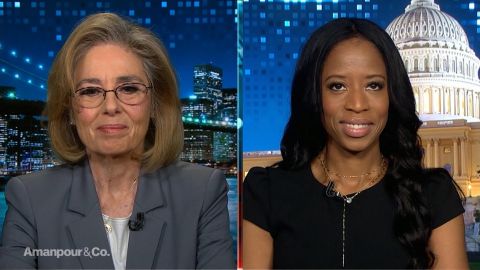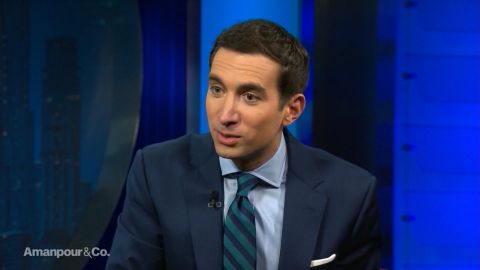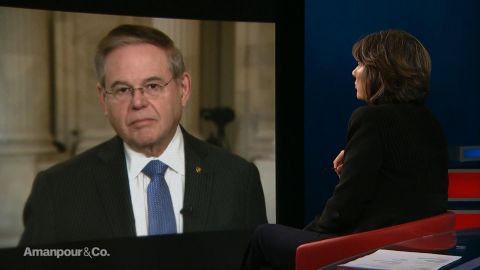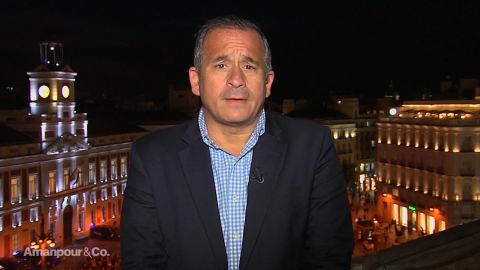Read Transcript EXPAND
CHRISTIANE AMANPOUR: Now we turn from Washington to Wall Street continuing our conversation with the bestselling author and “New York Times” financial columnist, Andrew Ross Sorkin. In part one of his discussion with our Walter Isaacson, among other things, Sorkin talked about how mass shootings could be prevented by monitoring credit cards. Now, he’s looking at the state of the financial food chain beginning with the backlash against globalization.
WALTER ISAACSON: Were we wrong to think that free trade would benefit everybody?
ANDREW ROSS SORKIN, COLUMNIST, NEW YORK TIMES: I think we were — I don’t think that globalization in the whole is a bad idea. I think that we misunderstood its benefits and misunderstood then the allocation of how those benefits would get allocated. And therefore, then you have to rethink a little bit of the system. And then that goes to taxes and goes to where people are domicile. I mean there are lots of ways to get at this, to “fix it”. The scary part is I don’t think there is a fix, a true fix that gets you back to this 1950, ’60s American Dream Leave it to Beaver idea anytime soon.
ISAACSON: But Trump then said tariffs and stricter trade deals will do it. Do you think there’s some truth to that?
SORKIN: Look, I actually don’t disagree that we have had an unfair trade practice with China, especially when it comes to IP and other things for a very long time and that there’s some interest in trying to fix that. The question, of course, is how do you fix it? What’s the approach more than just let’s fix it? And it doesn’t matter how we do it. So I think there are real issues that you would like to solve to some degree. But the other piece of this is it’s not that, you know, Nike or Apple is going to somehow leave China immediately and somehow bring all their manufacturing back to the United States. You know, Brooks Sneakers is now looking to Vietnam. They’re going to go to — still going to go to the lowest cost provider, it’s just may not be China. And so when — and when you don’t think about the world in a multilateral way, if you only think about it in a bilateral way, I think you miss the other pieces of the puzzle. So it’s not so clear to me that somehow we’re going to bring all of these jobs back here. And I do think that the transition cost and expense of this battle is real.
ISAACSON: What’s happening with Apple in China? And do you think it’s a symptom of something larger, either for Apple or for the tech industry globally?
SORKIN: Well, I think Apple and Tim Cook made a bet, a real bet on China and a real bet on the relationship between the U.S. and China on a long-term basis when they really effectively built their entire supply chain in China. And not only their supply chain there but an expectation that they were going to able to sell their product there. They clearly have now come out publicly and said that they’re missing their earnings estimates in part because of sales problems in China. And Apple product is a very — it’s as American as apple pie. I mean it’s become an iconic American piece. And it’s unclear if you are Chinese today whether you — whether that’s a good thing. In the same way, by the way, then the United States, I’m not so sure people would be running around buying Huawei phones here. So there’s sort of distinction. So there’s that as a real issue. And then on top of that, Apple, I think has another conundrum which it faces which is just the great and top, you know so much about, which is innovation. And what — how do you innovate? And how many great ideas does any one company or individual really have? You know, we’re now at a point where instead of upgrading your phone every two years, it’s going to push to three. Maybe it will ultimately push to four. They’ve made a lot of money every time we upgrade. What do you do about that? Is there the next iPad or the next — you know, what’s the next thing is this car, you know, all these things? And we haven’t seen that sort of step change innovation out of that company.
ISAACSON: What’s the next —
SORKIN: So I think it’s a combination of all of those issues.
ISAACSON: What’s the next innovation you would want?
SORKIN: I think all of us probably relate to health and biotech ultimately. I think what they’re doing with the watch, I have an Apple watch, I wear it, with EKG I think is interesting. I actually think, by the way, that may actually turn out to be a big piece of all this. But what do I want? What I — I want Siri to understand me.
ISAACSON: Yes, voice recognition. That would be an amazing thing if it really worked.
SORKIN: What I can’t figure out is why I can’t say to a phone, “Hey, get in touch with Walter. We want to set up lunch”, and then it just figures it out it. It has your calendars, my calendar, it should just be able to do that. It seems to me preposterous that we are in this day and age and — of great technology and [13:45:00] that still requires a lot of handiwork.
ISAACSON: And I remember the old days covering voice recognition, 20, 30 years ago. They said it’s just around the corner, it doesn’t fully work. Let me ask you about the disparity in compensation of CEOs versus workers. That seems to have grown and grown and grown. Why is that and is that part of the problem our country is facing too?
SORKIN: I think it’s a problem in so far as it creates a schism in this country. It creates a psychological schism among the haves and the have nots in this idea that there’s this greater sense of inequality than ever before. So that part is real. You ask why? Part of it is that I would argue, when you — when most companies hire an employee, it is a market-based idea, right? I’m going to hire you. I’m thinking to myself, what is the least amount of money I can pay you to come to this job and be happy and stay here? But I probably don’t want to pay you much more than that if I could avoid it, right? I’m not sure that that’s actually the approach that boards take when they are hiring CEO or trying to keep a CEO. It is based on a remarkable sort of netherworld of consultants and advisers and other people who keep comping or creating comparables of how much one person is being paid, and comparing them to the other person. Well, this person is getting paid this and this other person, she gets paid this. Should they? I mean these are real questions. And I hate to say it but I think there’s an old boys’ club. Hopefully, some more girls and women will be a part of that club. By the way, I think in terms of pay, there’s still a remarkable pay disparity. Because one of the other problems is, yes, when an employer tries to hire a person and they say I want to pay them basically as much as the market will bear but probably not much more. If women start a lower rate than men, how are they supposed to bring those wages up? How are they supposed to level things out?
ISAACSON: You know our country seems to be being torn apart politically and in every other way. Is — and you almost fear that capitalism itself is in the crossfire–
SORKIN: Oh, absolutely.
ISAACSON: — between left and far right.
SORKIN: A hundred percent.
ISAACSON: What can capitalism and capitalists do to totally reform that concept of capitalism to make sure it survives another hundred years?
SORKIN: Well, look, I do think that the idea of capitalism is under fire. But the issue to me is about what capitalism is. And you know, it’s — just the word capitalism has become almost religious for certain people. On both sides of this aisle, capitalism, I would argue has done wonderful things on a global basis and brought so many people out of poverty. The numbers are staggering. And yet if somebody in China or Africa has been a great beneficiary of capitalism, it is arguable also that there are certain people in developing countries who are not experiencing that in the same way. And so they look at that and they go, “That’s not me.” I think that we have to redefine some of this a little bit. It goes back to these profits. It goes back to this idea of purpose. It goes back to this idea of creating some kind of stability and less anxiety. But I think that’s about politics. I think it’s about — I think business has a role to play but I think it really requires leadership across the board to get any of these things to happen.
ISAACSON: Does Elizabeth Warren or Casio-Cortez, are they on to something?
SORKIN: It’s a great question. You know, I think that they — there are ideas within what AOC is saying these days and ideas within what Elizabeth Warren is saying that do make some sense. I think that for others, they’re so extreme that they’re not going to be taken seriously. Look, anti-trust law in the United States has effectively been diminished over the last 30 or 40 years. There’s less competition. You look at the biggest companies in this country and they’re bigger than they’ve ever been. Talk about too big to fail. Too big to manage, by the way, is a whole other issue. So I think there are real things that you could do to solve some of this. But I don’t think anyone of them individually — you know, I think a tax rate — a marginal tax rate at 70 or 80 percent for the very wealthy I think is a hard one to get past. So I think — but I think there’s a — I think there’s lots of different levers and it would have to be holistic, holistic is tough.
ISAACSON: And you talk about anti-trust. With this big tech backlash, should we have let Facebook buy Instagram, take over WhatsApp and grow? And is there an argument that Facebook, Google, Amazon have now spread [13:50:00] into so many different industries that they’re suppressing competition and there’s got to be more anti-trust enforcement?
SORKIN: So here’s the great conundrum. The great conundrum is that in this day and age of technology, scale matters. By the way, you can toast Microsoft early on. Scale matters. You want integrated products. As a consumer, you enjoy products that all work together. I think that actually matters. And then in the age of AI and machine learning, data is the new oil, right? So the people who are going to have the most success with AI and innovation on that front need lots of data running through to be able to test out their systems. So there’s an argument that you want three or four major players in the sort of Pepsi-Coke like battle. But there’s also an argument to be made that the kid in their garage who built some of the last great innovations in technologies doesn’t stand a chance anymore. Because they won’t have the same type of access to that pipeline of data, that oil, anymore. And so I’m very nixed about sort of where that lands and what kinds of controls you want to put on these companies. You know, if you said to me, how do you break up Google tomorrow? It’s not like you can just, you know, write it down in a piece of paper and say this goes over here and this goes over here and this goes over here in this goes over here. So it’s — unlike Apple — I’m sorry unlike AT&T with the Baby Bells, you – – they were — it was very breakupable. It was very —
ISAACSON: Well, the cloud (CROSSTALK) was Microsoft.
SORKIN: Right.
ISAACSON: You just mentioned Microsoft. But you also said it’s really good when people bundles a project —
SORKIN: It is.
ISAACSON: — products because they work together better. But what happened in the Microsoft case over the years, was they were barred from bundling the browser into the operating system, barred from bundling search into the operation. And thus, Google gets to be born in the garage.
SORKIN: Born, yes.
ISAACSON: Are we losing that now?
SORKIN: I think there’s probably an element that we are losing that now. And look, the question — but again, the question is how do you do it. I mean that’s the — that’s where I come down is how do you do it? Is Amazon too big? Amazon on an actual per business is very small. Whole Foods, everyone was worried about Whole Foods. Whole Foods is very small, small relative to other supermarkets. Books, they have huge, huge — I mean that’s where they probably have the monopoly. But everything else is actually tiny. But the collective, does that change it? And so these are the issues I think we’re all grappling with.
ISAACSON: But one of the ways to address it is the notion that if you have dominance, you can’t use that to leverage —
SORKIN: Exactly.
ISAACSON: — into another feel.
SORKIN: Right.
ISAACSON: And that’s what’s been happening with say Facebook.
SORKIN: A hundred percent. But the question is, are you leveraging just the fact that you’ve made all of this money and therefore you have a lot of money to go buy other things? Or you’re actually leveraging — for example, one of the things I worry about with Amazon is Amazon has so much information about the shopper, that they are now starting to create their own products to compete with the products that are on their own platform. You know, by the way, Walmart and Costco have done that forever. They’ve had white label. Approximate, this feels like it may be at a different level. I don’t know. But these are the issues that I think we need to focus on and talk about and debate. And one of the things I worry about is that there’s not enough conversation about it.
ISAACSON: Are we due for another financial crisis and are we ready for it?
SORKIN: So Jamie Diamond was called in 2000, in the middle of financial crisis, by his daughter I believe then was in high school and said, “Daddy, what’s a financial crisis?” And he said back to her, “Something that happens every seven or eight years.”
ISAACSON: I’m looking at my watch.
SORKIN: Yes, look at your watch. If he’s right, we’re way overdue. Do I think we will have another crisis of some sort? Absolutely. Will it look like what happened in 2008? In my mind, absolutely not. It could be better but, by the way, it also could be worse. The one thing that I feel like was the lesson for me in the financial crisis and in writing Too Big to Fail is that every financial crisis is really a function with one thing. It’s debt. It’s leverage in the system. You can have all the bad actors you want doing all the bad things you could imagine, whether it’s credit rating agencies being conflicted or bankers being greedy regulators not minding the store or you name it. But in the west, there’s leverage in the system. It doesn’t matter. And so you say to yourself, OK, where’s the leverage now? Well, there’s corporate leverage. That’s real. I don’t think we have it in the banking system so much. But where is the real debt? Where’s the real leverage? When I wrote Too Big to Fail, we used to use that phrase in the context of banks. Today, we use it in the context of countries. And when you talk about the relationships between countries, the fact that China, for example, owns so much of our debt, that’s where all of this gets really interesting. Interesting in a bad way, I hate to say.
ISAACSON: And so what should we do?
SORKIN: To me, the long-term thing that we need to fix way beyond the corporate system, but the corporate system is obviously a huge piece of it because it pays the taxes and creates real revenue for the country, is we need to somehow fix the larger debt problem in the United States at a country level. But that’s a hard one.
ISAACSON: Andrew, thank you for being with us.
SORKIN: Thank you, Walter. Appreciate it.
About This Episode EXPAND
Christiane Amanpour speaks with U.S. Sen. Bob Menendez about the state of Venezuela’s government; Venezuelan National Assembly Member Francisco Sucre about interim President Juan Guaido; and Barbara Res & Mia Love about the U.S. government shutdown. Walter Isaacson speaks with New York Times Columnist Andrew Ross Sorkin about why we’re overdue for a financial crisis.
LEARN MORE



